 |
Formation of Children
Home-schoolers: Booming and Successful
Dave Bohon
A new study from the National Home Education Research Institute (NHERI) estimates that there are over two million children currently being home-schooled in the United States. The author of the study, NHERI’s president Dr. Brian D. Ray, analyzed data from both state and federal education agencies as well as private home-school groups, concluding that there are as many as 2.346 million home-schooled students across the nation.
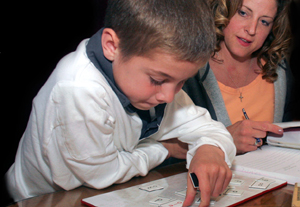
Homeschooling, a strong and growing movement |
According to the U.S. Census Bureau, in 2010 there were about 54 million children between the ages of five and 17 in the U.S., meaning that nearly four percent of school-aged children — or one in 25 — are being home-schooled.
Factored into the study was Ray’s calculation that an estimated ten percent of home-schooled families are “underground,” meaning that parents have chosen not to register their children with the State because of compulsory attendance laws and other concerns.
“Today, home schoolers can be found in all walks of life,” noted a press release from the NHERI, “and with … a proven record of academic as well as social success, home-schooling is rapidly becoming a mainstream education alternative.”
Michael Smith, president of the Home School Legal Defense Association, called the latest numbers “remarkable,” noting that “just 30 years ago there were only an estimated 20,000 home schooled children.”
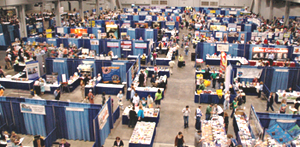
The Midwest Home-schooling Convention in Cinncinati hosts hundreds of booths |
Ray predicts another “notable surge” in home-schooling numbers in the next five to ten years, as those who were home-schooled in the 1990s choose that education option for their own children as well.
A 2006 study by the Department of Education found that 31% of parents who taught their children at home did so out of concern for the public school environment, citing such issues as “safety, drugs or negative peer pressure.” Another 30% said that home-schooling offered them the ability to “provide their children with religious or moral instruction.” An additional 16.5% of parents cited dissatisfaction with “the academic instruction available” in the public schools, while about 14% said they chose home-schooling because of special needs of their children.
High performance
While public school officials and education “experts” have tried to denigrate the home-schooling option as inferior to the tax-funded marvel of public education, both research and anecdotal evidence has demonstrated that children taught at home perform better than their public school counterparts.
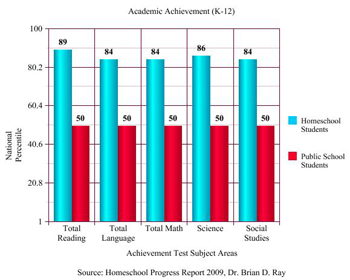
Home-schoolers consistently outperform public schoolers |
For example, a 2009 study by the NHERI found that home schoolers score an average of 34 to 39 percentile points higher than the norm on standardized achievement tests. According to Dr. Ray, who headed up the research, the national average for home-schooled students ranged from the 84th percentile for language, math, and social studies to the 89th percentile for reading.
The study also found that achievement gaps common among public school students do not exist among home-schoolers. Among the findings:
- Home-schooled boys (87th percentile) and girls (88th percentile) scored equally well on standardized tests.
- The income level of parents was not an appreciable factor in how home-schooled students performed, with children from poorer households (incomes under $35,000) scoring in the 85th percentile, and those from wealthier homes (income over $70,000) scoring in the 89th percentile.
- Although the education level of parents did have somewhat of an impact on the results, even home-schoolers whose parents did not have college degrees scored in the 83rd percentile, well above the national average for public school students.

Home-schooling graduates are sought out by many colleges |
Research also confirms that the high performance of home-schooled students continues when they reach college. The Journal of College Admission cited a recent report showing that “home-school students possess higher ACT scores, grade point averages (GPAs) and graduation rates when compared to traditionally educated students.”
Research last summer by Dr. Michael Cogan of the University of St. Thomas in Minnesota revealed that home-schooled college students fare better than conventional students on a number of levels:
- They earn a higher first-year GPA (3.41) than the overall average (3.12).
- Similarly, their fourth-year GPA (3.46) bests the overall average (3.16).
- They have a higher college graduation rate (66.7%) compared to the overall population (57.5%).
- According to Gena Suarez, publisher of the Old Schoolhouse magazine, on average home schoolers score “37 percentile points above the national average on standardized achievement tests and typically score above average on the SAT and ACT.”
Successful and well-adjusted youth
Those numbers have caught the attention of colleges and universities across the Nation, particularly private Christian institutions, which often send recruiters and admissions counselors to home-school conventions and target families that teach their children at home through direct-mail campaigns, promotions in home-school magazines, and with ads on websites.
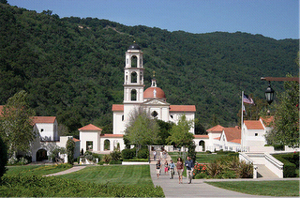
Homeschoolers - most welcome at colleges like Thomas Aquinas College in California |
Schools such as the prestigious Wheaton College, which boasts that 10% of its incoming freshmen are home-school grads, sponsor such events as “Home School College Days,” where potential students can visit campuses and even meet with current college students who were taught at home. Others such as Regent University, founded by Christian media mogul Pat Robertson, flash ads on their websites touting themselves as the “the right choice for home-schooled students.”
But it is not just Christian universities that are reaping the benefits of home-schooled students. Suarez cited one successful home-schooler, Seth Back, who got his GED at age 15 and is currently a student at Harvard University. Suarez noted that over the past five years, Back has earned “a juris doctor degree, passed the California Bar Exam, earned a master’s degree in Church history, and studied at Oxford — all while managing his own consulting business.”
Back credits home-schooling for his success, saying that because of it he was “better prepared for certain college situations than students who had been through the public/private school system.”
And what about after college? All indications are that home-schooled students are among the most prepared to take their place as productive members of society. A 2004 study by Dr. Ray and NHERI of more than 7,000 home-schooled graduates found that 71% had participated in ongoing community service activities compared to 37% of U.S. adults of similar ages, and 76% had voted in a national or state election, compared to 29% of graduates who had not been home-schooled.
“Home-schoolers clearly learn about the real world, possibly more than do their public school counterparts,” commented Dr. Michael Romanowski, an education professor at Ohio Northern University. “While the purpose of public education is to educate future citizens who take an active role in improving the social, economic, and political conditions in society, Ray’s research indicates that public schools, not home-schooling, should be scrutinized for their efforts regarding ‘citizenship training.’ ”
As a relevant side-note, home-school proponents point out that when U.S. Representative Jaime Herrera Beutler (R–Wash.) was sworn in for her freshman term on January 3, she became the first home-schooler in modern history to be elected to Congress. They are confident that she will not be the last.
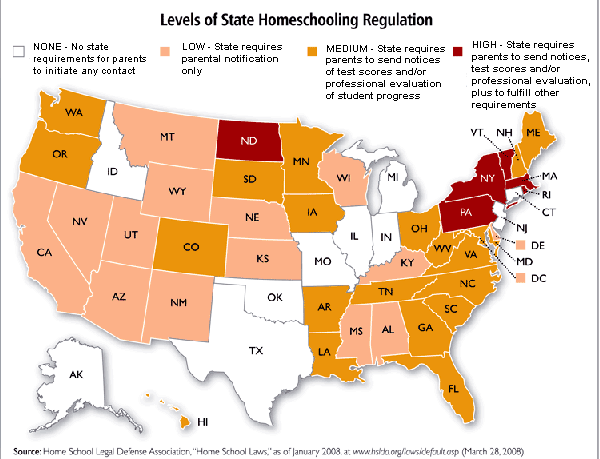
How home-school friendly is your state?
|
This article
"Two Million Home Schooled, New Study Estimates" by Dave Bohon
was first posted on The New American website on January 10, 2011
Posted July 27, 2011


Related Topics of Interest
 Latin: No Longer a Dead Language Latin: No Longer a Dead Language
 Choosing a University and the Catholic Extended Family Choosing a University and the Catholic Extended Family
 Order and the Spirit of Order Order and the Spirit of Order
 Courtesy & Homeschooling Courtesy & Homeschooling
 Courtesy in the Catholic Home Courtesy in the Catholic Home
 Messy Home-Schooling Messy Home-Schooling
 Home-Schooling: Necessity and Feasibility Home-Schooling: Necessity and Feasibility
 Co-Education Is a False and Harmful Method of Teaching Co-Education Is a False and Harmful Method of Teaching

Related Works of Interest
|
|
Formation | Cultural | Home | Books | CDs | Search | Contact Us | Donate

© 2002- Tradition in Action, Inc. All Rights Reserved
|
 |
|